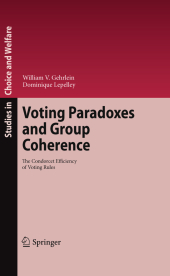 Neuerscheinungen 2013Stand: 2020-01-07 |
Schnellsuche
ISBN/Stichwort/Autor
|
Herderstraße 10
10625 Berlin
Tel.: 030 315 714 16
Fax 030 315 714 14
info@buchspektrum.de |

William V. Gehrlein, Dominique Lepelley
(Beteiligte)
Voting Paradoxes and Group Coherence
The Condorcet Efficiency of Voting Rules
2013. xii, 385 S. 56 SW-Abb. 235 mm
Verlag/Jahr: SPRINGER, BERLIN 2013
ISBN: 3-642-26610-X (364226610X)
Neue ISBN: 978-3-642-26610-2 (9783642266102)
Preis und Lieferzeit: Bitte klicken
This book argues that strange election outcomes should become less likely as votersī preferences become more mutually coherent. It also focuses on the Condorcet Criterion, which states that pairwise majority rule winner should be chosen as the election winner.
The likelihood of observing Condorcetīs Paradox is known to be very low for elections with a small number of candidates if votersī preferences on candidates reflect any significant degree of a number of different measures of mutual coherence. This reinforces the intuitive notion that strange election outcomes should become less likely as votersī preferences become more mutually coherent. Similar analysis is used here to indicate that this notion is valid for most, but not all, other voting paradoxes. This study also focuses on the Condorcet Criterion, which states that the pairwise majority rule winner should be chosen as the election winner, if one exists. Representations for the Condorcet Efficiency of the most common voting rules are obtained here as a function of various measures of the degree of mutual coherence of votersī preferences. An analysis of the Condorcet Efficiency representations that are obtained yields strong support for using Borda Rule.
Voting Paradoxes and Their Probabilities.- Condorcetīs Paradox and Group Coherence.- Other Incompability Paradoxes.- Other Voting Paradoxes.- Condorcet Efficiency and Social Homogeneity.- Coherence and the Efficiency Hypothesis.- Other Characteristics of Voting Rules.- The Significance of Voting Rule Selection.- Complete PMR Ranking Efficiencies.
From the reviews:
"This book bridges the gap between the theoretical literature showing the possibility of counterintuitive results and the empirical findings of many experiments in which these counterintuitive results hardly or not at all appear. This is a very well written book, extremely rich in information, integrating many existing and new results and with an impressive number of references to the literature. It is an important and relevant step forward in the Theory of Social Choice, highly recommended to anyone interested in this field." (H. C. M. de Swart, Zentralblatt MATH, Vol. 1252, 2012)


